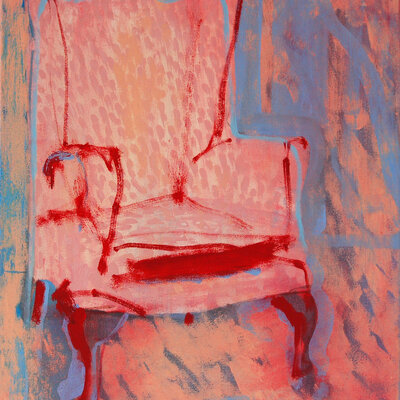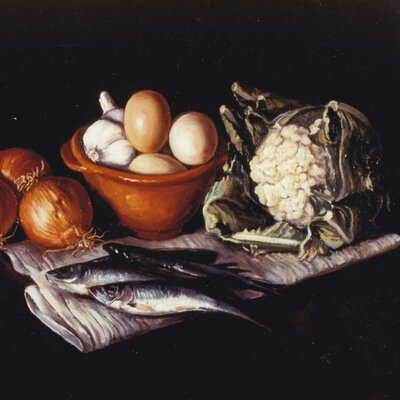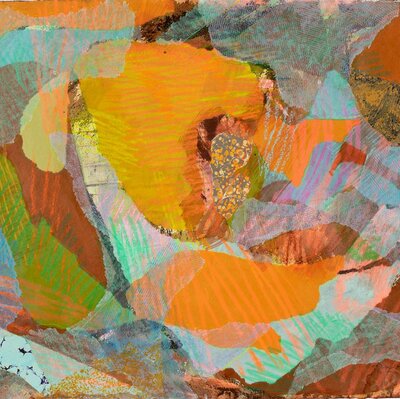Through your painting practice in watercolour, you will be encouraged to develop your technical skills with the medium, and to extend your responses to your subject matter, whilst exploring your understanding of contemporary painting and the use of watercolour within it.
Using exercises, the tutor will ask you to develop technical approaches to your work. Exercises may invite you to work in a particular way or with a specified approach or materials, or both. Exercises may involve drawing, painting, writing or a combination of these.
By looking at examples of other artists work, you will be introduced to various contemporary painters and working methods. The aim is to show a range of possible strategies which you might employ in your work. This will also help to develop your understanding of watercolour as a contemporary medium and inspire your thinking.
Through group discussions and individual tutorials, you will be pushed to extend your thinking and conceptual approaches. You will be required to engage in individual reflection in relation to your practice. Group tutorials will be used as a way of introducing new ideas, to summarise progress in the context of collective feedback and thought, and to develop your understanding of your painting practice within the context of contemporary painting generally. The concept of reflective studio practice will help you to develop the notion of critical thinking in relation to your work.
The course is couched within the broader art-historical context of watercolour painting - you will be asked to consider your practice in relation to this history, challenging notions of watercolour as a medium and the innovative use of watercolour as a contemporary painting medium.
By the end of the course, you will have increased knowledge and understanding of your approach to watercolour painting, your conceptual thinking around the medium and begun to be a reflective studio practitioner. You will have improved handling of your materials and started to understand your watercolour work within the broader context of contemporary art history.
What students need to bring
The following list is provided as a suggestive guide. Please feel free to bring along whatever equipment is suitable to your practice:
- Any watercolour/water-based pigments of your choice - reds, blues and yellows, possibly a black and a white, plus any other pigments that you like to use
- A range of brushes large and small, plus any other implements for applying pigments
- A plentiful supply of papers or supports in various sizes
- Sketchpads in a variety of sizes, a water container, 3B, 5B and 8B sketching pencils, water-soluble graphite pencil
- A lightweight board, if required on location
- Gummed tape and/or bulldog clips, palette, craft knife, putty rubber, tissues, drawing/technical pens, camera, biro and notebook
You may also want to bring photographs, postcards, magazine/newspaper images, illustrations, etc., if you think these might be suitable subject matter for some of your work.
*NB. The College has a ready supply of large A1 size drawing boards suitable for studio use, as well as studio and sketching easels.
No specific preparation or reading is required, but you may find it useful to have a look at any text about contemporary painting /contemporary art history (1960s onwards). Any other text which extends your thinking about your painting practice, the medium of watercolour and your understanding of what painting is, may also be useful. Please feel free to bring these texts with you.
Available to buy
Available from shop:
A good supply of watercolour paints, brushes, papers and sketchbooks is available, along with pencils, rubbers, palettes, gummed tape, water soluble graphite pencils, craft knives, drawing/technical pens, biros and notebooks.
Additional information
Throughout the course you will be working in the studio and, possibly, outside at times - please bring whatever equipment/clothing you feel is suitable to both situations. This includes stout covered footwear, i.e. no open-toes or sandals.
Arrival day
Residential students can arrive from 4pm, non-residential students to arrive by 7.15pm for registration. Students arriving earlier are welcome to purchase dinner in the College Dining Room from 6pm.
Students meet their tutor in the Bar at 7.30pm prompt to go to studios.
First Teaching session: 7.30pm - 9pm (attendance is essential)
Daily timetable
Course teaching: 9.15am - 5pm
Morning session: 9.15am - 12.45pm including coffee/tea break
Lunch break: 12.45pm - 2pm*
Afternoon session: 2pm - 5pm including coffee/tea break
Teaching finishes: 5pm
Evening working: students may have access to workshops until 9pm, but only with permission from the tutor and provided any health and safety guidelines are observed.
Departure day
Course teaching: 9.15am - 3pm
Teaching finishes: 3pm
Residential students will need to check out of rooms by 10am.
Please note, the tutor may make slight variations to the daily timetable as required.
*Lunch can be purchased on campus, view options





